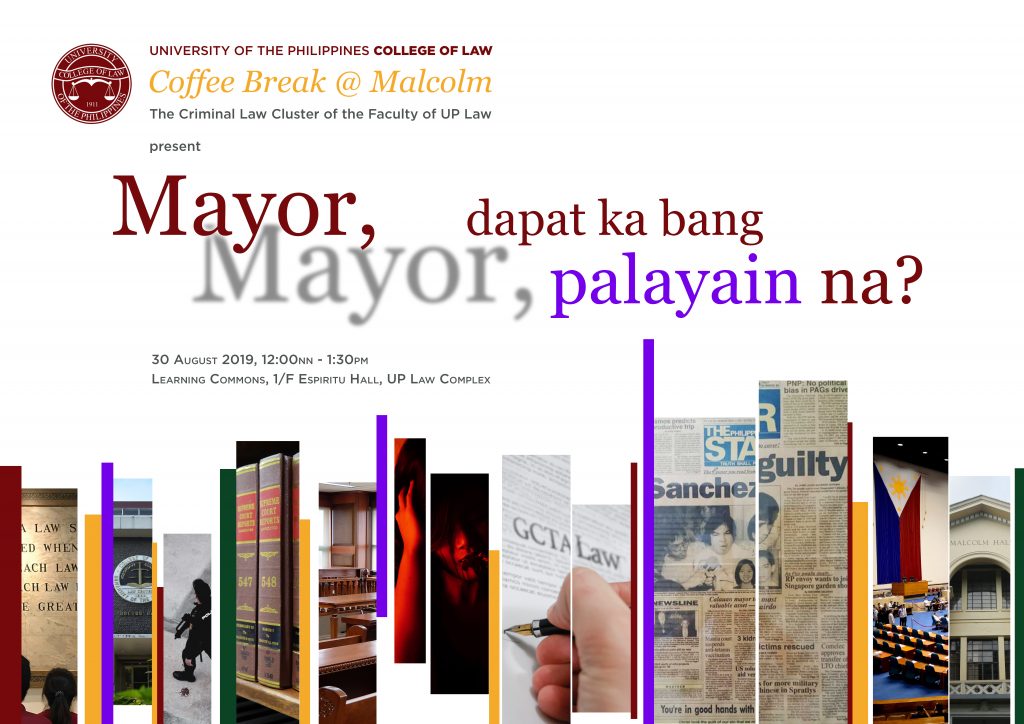“Mayor, mayor, dapat ka bang palayain na?” – discussions on the Good Conduct Time Allowance Law and Mayor Sanchez’ impending release.
News of Mayor Sanchez’ impending release from prison shook the country; reliving the collective dread Filipinos felt for the rape-slay of UPLB students Eileen Sarmenta and murder Allan Gomez more than twenty (20) years ago.
On 30 August 2018, the UP College of Law held the faculty discussion “Mayor, Mayor, dapat ka bang palayain na?” – a spirited balitaktakan on the merits and application of the Good Conduct Time Allowance Law (“GCTA Law”) as part of the Coffe Break @ Malcolm series of talks.
The discussions focused on key matters of the GCTA Law, particularly: (1) That the determination of the exact number of days of time allowance is the exclusive prerogative of the Bureau of Corrections, (2) That the time allowance is determined per month, and (3) That the law was passed on good will of our legislators hoping to emulate the restorative justice of European Penal Systems.
Despite the initial controversy stirred by the law on account of the impending release of Mayor Antonio Sanchez, the conversation veered to its purpose and why, despite its problematic implementation, it is still a valuable law.
The Panel, consisting of Dr. Janette Padua of the Parole and Probation Administration, Professors Dan Calica, Ronald Solis and Sandra Olaso-Coronel, and OLA Supervising Lawyer Atty. Marwil Llasos, held forceful interpellations on the matter.
Professor Olaso-Coronel pinpointed the decrepit state of our prisons. Prisons are overstocked and filled beyond capacity. In the Manila City Jail, the air is heavy and putrid with the smell of sweat – where 500 men fit in the space for 150. Unsanitary water and poor conditions suffered by the prisoners is punishment worse than deprivation of liberty. This decrepit and insufferable state of prisons is largely due to the overburdening of our prisons, which the GCTA Law can ameliorate.
However, news of Mayor Sanchez benefitting from the law outraged the public. On top of the heinous gang rape-execution, Mayor Sanchez—according to unverified reports—was while imprisoned found in possession of Marijuana in 2006; millions of pesos in shabu in 2010; installation and use of an air conditioning machine in 2015.
Such acts, Dr. Padua argued, were evidently not of “good conduct.” Yet, Mayor Sanchez stood to benefit from the law because time allowance is allotted monthly. Allotted monthly means that Mayor Sanchez’ non-observance of jail rules and regulations on one month (such as being found with drugs) only meant he should not be given good conduct time allowance for that month. Despite this, he is still eligible to receive good conduct time allowance for the months after.
Graduating UP Law student Gerard Caisip first asked the Panel why then did the BuCor not prosecute Mayor Sanchez’ possession of drugs. The Panel replied succinctly that strange as that may be, no one knows why the BuCor did not prosecute those offenses.
Going back to his intended question, Mr. Caisip asked what should be the interpretation of “Good Conduct.” Mr. Caisip raised that the word “good conduct” is defined in the GCTA Law’s IRR refers to “conspicuous and satisfactory behavior … active involvement in rehabilitation programs, … coupled with faithful obedience to all prison/jail rules and regulations.” Unfortunate as it may be, it seems that in practice, it is the BuCor that defines what “good conduct” is, and the amount of time allowance granted to the inmates.
UP Law alumnus Atty. Justin Ordoyo, an associate in Divina Law, also raised that much of the controversy arose from Section 1 of RA 10592, which amended the Article 29 of the RPC, which—at the risk of oversimplifying it—excluded persons charged with heinous crimes from the benefit of the GCTA Law.
Atty. Ordoyo raises the point that the exclusion of persons charged with heinous crimes only came as amendment in RA 10592 in October 10, 2013—decades after the crime, the trial and the promulgation.
Applying Article 22 of the RPC which provides that penal laws shall have retroactive effect insofar as they are beneficial to the accused provided that they are not habitual criminals, and applying the ruling in Inmates of the New Bilibid Prison v. Sec. de Limawhere the Supreme Court held that RA 10592 has the effect of diminishing the penalty and hence is beneficial to the accused. Therefore, only the positive effects of RA 10592 shall be retroactive unless he is a habitual criminal. On the other hand, its more punitive provisions (excluding from the application of the GCTA Law those charged with heinous crimes) should not apply to Mayor Sanchez.
An audible gasp could be heard from the Malcolm Theater as soon as he finished his question. Atty. Ordoyo was quick to reassure the audience and the Panel that the question is of purely legal analysis only and not as a call for Mayor Sanchez’ release.
Atty. Marwil Llasos from the OLA, consistent with his characteristic wit and humor, laughed at the question and then answered Atty. Ordoyo, praising him “Ganyan ang UP Law, matalino.” Atty. Llasos continued, “We have a test case now using the same legal arguments. We shall see how the Courts will rule on the matter.”
As a last word, Professor Olaso-Coronel reminded the students to keep their minds sharp. It is strange that the outrage only comes now when there have been 22,000 inmates of non-heinous crimes and even 2,000 inmates of heinous crimes released since the effectivity of the RA 10592 in 2013. The way the public consumed news of Mayor Sanchez’ release renewed calls for the re-imposition of death penalty. She cautions students to remember that the issue of death penalty should not be decided only upon the morality of Mayor Sanchez’ release—but on its overall merits before Philippine society.








































































































 on the upper right corner to select a video.
on the upper right corner to select a video.